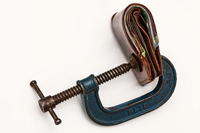 As a pet owner, you would do anything to care for your furry friend. Have you ever thought about what will happen to your pet when you’re gone? Millionaire Leona Helmsley’s dog Trouble received $2 million, which allowed him to live in a hotel with the best security, grooming and food. Because you may not have millions to spend on your pet, consider several options that ensure your pet receives ongoing care if something were to happen to you.
As a pet owner, you would do anything to care for your furry friend. Have you ever thought about what will happen to your pet when you’re gone? Millionaire Leona Helmsley’s dog Trouble received $2 million, which allowed him to live in a hotel with the best security, grooming and food. Because you may not have millions to spend on your pet, consider several options that ensure your pet receives ongoing care if something were to happen to you.
Rule Out Life Insurance
Life insurance is one asset that allows you to declare a beneficiary. Before you select your pet to receive your death benefits, realize that because pets are considered property and are unable to sign legal documents, they are disqualified from this option.
Ask Someone to Care for Your Pet
You could ask a trusted family member, neighbor or friend to care for your pet after you die. Check in with your trusted caretaker regularly to ensure he or she is still interested and financially able to care properly for your furry friend.
Purchase Pet Insurance
Like your health insurance, pet insurance covers medical treatment your pet may need. It’s a valuable resource that a caretaker can use to care for your pet after you’re gone.
Establish a Trust
A trust is a legal entity that safeguards money for specific purposes, in this case pet care. To set up a trust for your pet, take these steps.
Choose a trustee. Select someone who will be ready and available to care for your pet according to your specifications. It’s also a good idea to choose a backup trustee.
- Decide the worth of the trust. Calculate the total cost of your pet’s care per year multiplied by the estimated number of years your pet has left to live. Remember to factor in extra expenses like medical treatment, medicine or a special diet.
- Do not name your pet in the trust. Generic wording that ensures all your pets are cared for when you die eliminates the need to rewrite the trust when you get a new pet or pets.
- Select a trust duration. Unfortunately, your pet will not live forever. Word the trust so it provides care for your pet for 21 years or until the death of your pet, whichever occurs first.
- Choose a remainderman. This person will receive any money left in your trust after your pet dies. Verify that the remainderman will not kill your pet to get your money.
You can care for your pet even after you’re gone. Talk to your financial advisor or attorney to ensure your wishes and your pet’s needs are met.














